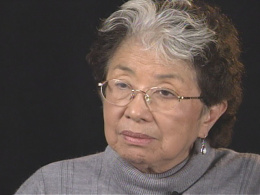Feminist Theorist Thursdays: Mitsuye Yamada

Image Courtesy of Densho Encyclopedia
Mitsuye Yamada is a Japanese American poet, short story writer, educator, and activist. As a teenager, Yamada’s family was directly affected by the increase in anti-Japanese discrimination during World War II. Her father was arrested on suspicions of espionage following the attack on Pearl Harbor, despite a dearth of evidence. Shorty after, her family was interned at Minidoka War Relocation Center, Idaho, in 1942. Yamada was allowed to leave Minidoka after renouncing her loyalty to Japan and subsequently pursued a career in writing, eventually becoming a Professor of English at Cypress College, Seattle in 1968.
Yamada’s father encouraged her foray into poetry and largely influenced its confrontational style. In her childhood home, he regularly hosted clubs for senryu poetry — a 17-syllable Japanese poem that captures themes from the everyday. Yamada recalls how this creative immersion inspired her to produce poetry and prose of her own. She later took up the company of radical feminist poets, who prompted her to abandon the formalist prose she learned in school for a poetry laced with politics. Her experiences in internment also impressed an urgency to air social issues and actively defy erasure: “The camp experience suddenly was a great awakening. I realized that it’s dangerous to be totally invisible.”
Yamada began writing her debut book, “Camp Notes and Other Poems” (1976), during her 18 months of internment. The collection details her experiences in the Minidoka internment camp, exposing the racism faced by Japanese Americans during and after World War II. In her poem, “The Question of Loyalty,” Yamada describes the ultimatum faced by those in the camps: they had to renounce allegiance to Japan or remain in the camps indefinitely. Yamada herself was only allowed to leave upon renouncing loyalty to Japan in a loyalty questionnaire. The lines “If I sign this / what will I be?” capture the humiliation and uncertainty of having to reject one’s Japanese citizenship, as well as the psychic wound created by the forced denial of one’s heritage.
“Camp Notes” constitutes not only an undressing of American racism, but a refusal of culturally prescribed silence. In order to unveil the discriminatory practices of the U.S., Yamada defied norms of silence imposed on Japanese American women. She is one of the first Japanese Americans to publish a personal account of internment. Yamada reflects, “[internment] was just something that we never talked about. It’s an experience that one had to be ashamed of.” The silence surrounding internment owes to a strong avoidance of shame in Japanese culture. Wartime suspicions against Japanese Americans amounted to humiliation and dishonor, which are typically dealt with in private. The stigma against speaking out, in addition to discriminatory publishing practices in post-war years, delayed the publishing of “Camp Poems” until 1976 — a whole 33 years after Yamada’s internment.
“Desert Run: Poems and Stories” (1988) revisits her experiences in the internment camp. This book explores identity and heritage, grappling with the cultural dissonance of being a Nisei, a second-generation Japanese immigrant. Poems such as “Guilty on Both Counts” explore the intermingling of Yamada’s American and Japanese identities. Her poems also tackle issues of sexual and domestic violence within the Japanese American community, imbuing popular anti-racist discourse with an explicitly feminist consciousness:
I prayed for her
that her pencil thin neck
would not snap
or his rage would be unendurable.
These lines from “The Club” capture the terror and tension that hovers in abusive households, conveyed through an abused wife’s concern for a wooden figurine. Yamada’s poems were groundbreaking for their time, exploring the intersections of race and gender before the emergence of intersectionality theory in 1989.
Yamada boasts an extensive record of human rights activism, serving on Amnesty International’s national board of directors. She promoted the redress movement, launched in 1978, which calls for the U.S. government to financially and morally compensate Japanese Americans for mistreatment during World War II.
Yamada is devoted to elevating the voices of Asian women in light of historical erasure. She co-founded Multicultural Women Writers of Orange County to support Asian women writers, encouraging them to charge their writing with politics. In an interview with “Contemporary Women’s Writing,” she states, “Any great work of art has its impetus from what’s going on in the world and in the consciousness of the artist herself. It’s unfortunate that we think we should either be making politics or be making art.“
Yamada’s political inclinations have informed her teaching career. She has advocated for the introduction of multiculturalism into English curricula, and has successfully lobbied for an Asian American Studies Program at the University of California, Irvine. Yamada continues her career as a writing consultant, poet in residence, and a teacher at various universities.




